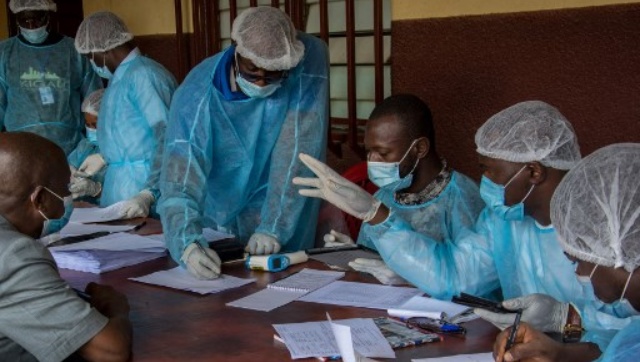Guinea confirmed a case of Marburg disease, caused by a lethal virus that’s related to Ebola and, like COVID-19, passed from animal hosts to humans, the World Health Organisation said earlier this week, The patient was a man who died on 2 August, eight days after the onset of symptoms. The village where he lived is near the borders with both Sierra Leone and Liberia. Tedros Adhanom Ghebreyesus, the WHO director-general, said Guinea’s ministry of health reported the case to the UN agency last week. “About 150 contacts have been identified and are being followed up, including three family members and a health worker, who have been identified as high-risk close contacts,” Tedros told journalists in Geneva. The Marburg virus belongs to the same family as Ebola, and previous outbreaks have erupted elsewhere across Africa in Angola, Congo, Kenya, South Africa and Uganda. Marburg symptoms include high fever and muscle pains, and some patients later bleed through body openings like eyes and ears. What is Marburg? Marburg virus is a highly dangerous pathogen that causes haemorrhagic fever. As noticed in past outbreaks, the average fatality rate is 50 percent, in a range of 24-88 percent, as per WHO. Here are some other key facts about Ebola’s lethal cousin
- The virus is part of the so-called filovirus family to which the Ebola virus also belongs.
- It takes its name from the German city of Marburg, where it was first identified in 1967, in a lab where workers had been in contact with infected green monkeys that had been imported from Uganda.
- Two other outbreaks occurred at the same time in Frankfurt, also in Germany, and in Belgrade, then the capital of Yugoslavia, now Serbia. Seven people died.
- Early supportive care with rehydration, and symptomatic treatment improves survival. There is as yet no licensed treatment proven to neutralize the virus, but a range of blood products, immune therapies and drug therapies are currently under development.
- Rousettus aegyptiacus, fruit bats of the Pteropodidae family, are considered to be natural hosts of Marburg virus. The Marburg virus is transmitted to people from fruit bats and spreads among humans through human-to-human transmission.
- Community engagement is key to successfully controlling outbreaks.
How is it transmitted? The natural “reservoir,” or host, of the Marburg virus, is the African fruit bat, as per the US Centre for Disease Control and Prevention. The cave-dwelling mammals carry the virus but do not fall sick from it, and can hand the virus to primates in close proximity, including humans: one suspected pathway is the killing or butchering of infected bats for food. The human-to-human transmission then occurs through contact with blood or other bodily fluids, or contact with surfaces such as bedding or clothing that are contaminated with these fluids. Some infections have happened accidentally in the lab, through needle wounds. What are the symptoms? The virus takes between two and 21 days to incubate, leading to abrupt symptoms of high fever, severe headaches, muscular pain, vomiting and diarrhoea — symptoms that can make Marburg difficult to diagnose initially, as they are similar to diseases such as typhoid and malaria. Haemorrhagic episodes typically follow between five and seven days later, with blood in the vomit and faeces and bleeding from the nose, gums and vagina. In fatal cases, death occurs most often between eight and nine days. What treatments are available? There are no vaccines or antiviral treatments for Marburg disease. However, rehydration with oral or intravenous techniques improves survival and experimental use of monoclonal antibody drugs has been promising.
This is why it is crucial to stamp out the disease from the outset, say experts.
“You have to step up surveillance, identify all contact cases in order to isolate them if they start developing the disease, to prevent any transmission,” said Ousmane Faye, a virologist at the Pasteur Institute in Dakar, the capital of Senegal. Other outbreaks The single case that has so far been detected in Guinea occurred in a village in the district of Gueckedou, in a forested region in the south of the country close to the borders with Sierra Leone and Liberia. The patient is a man who died on 2 August after developing symptoms on 25 July. Three of his relatives and health workers have been identified as being at high risk and are under close surveillance. Around 150 others, considered contact cases, are also being monitored daily. The country has also stepped up cross-border vigilance. Previous outbreaks and sporadic cases have been recorded in South Africa, Angola, Kenya, Uganda and the Democratic Republic of Congo. The deadliest epidemic so far occurred in northern Angola in 2005, in which 329 patients out of 374 died. Guinea is one of the poorest countries in the world. It was one of three countries, along with Liberia and Sierra Leone, which was hit by the biggest-ever epidemic of Ebola, an episode that ran from 2013-16 and claimed more than 11,300 lives. The second outbreak in Guinea began in February, killing 12 people before being declared over on 19 June. With inputs from Agence France-Presse


)

)
)
)
)
)
)
)
)



